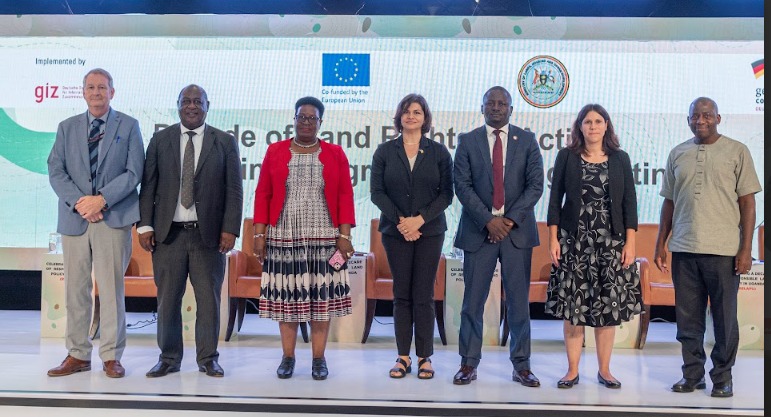The Responsible Land Policy in Uganda (RELAPU) project, implemented by GIZ, has concluded after nearly a decade of transformative work aimed at strengthening land rights and tenure security across the country.
Launched in 2016, RELAPU has played a crucial role in empowering rural communities—particularly women and marginalized groups—by promoting responsible land governance, formal ownership, and equitable access to land resources.
The project sought to bridge the gap between Uganda’s progressive land policy framework and its implementation on the ground.
Through awareness campaigns, conflict resolution, and capacity building, RELAPU helped communities gain confidence and clarity over land ownership—an essential step toward reducing poverty and hunger while promoting sustainable development.
Operating in Northern, North-Eastern, and Central Uganda, RELAPU has achieved measurable and lasting results.
According to GIZ, “over 86,000 households, including 26,353 female-headed households, have secured their land rights through the project’s interventions.”
The project also successfully mitigated land-related conflicts, “resolving 2,531 disputes in Central Uganda with an 83% success rate.”
Beyond conflict resolution, RELAPU enhanced compliance with international standards for responsible agricultural investments and improved smallholder farmers’ access to credit through recognized land documents. Many beneficiaries can now use their land as collateral or a productive economic asset—transforming land from a source of insecurity into an opportunity for growth.
During the National Celebration of Success and Learning, held at Speke Resort Munyonyo to showcase RELAPU’s achievements ahead of its official completion in May 2026, the Minister of State for Lands, Dr. Sam Mayanja, commended the programme’s transformative impact.
“We have witnessed progress in mapping of land, issuance of certificates of ownership, introduction of self-financing models, support for customary land documentation, community sensitization, and strengthening of grievance resolution mechanisms,” Dr. Mayanja said.
“RELAPU’s work has contributed immensely to improving land administration and justice across Uganda.”
The event brought together key stakeholders from the Government of Uganda, the European Union Delegation, the German Embassy, district leaders, civil society organizations, traditional authorities, and the private sector.
It served as a platform to recognize RELAPU’s contributions to Uganda’s land governance reforms and to promote knowledge sharing for continued progress.
James Macbeth Forbes, GIZ’s Country Director for Uganda, noted that, “Since 2016, the RELAPU Programme has contributed significantly to Uganda’s land governance agenda through five major components,” adding that its success has been rooted in close collaboration with government and communities.
Moses Musinguzi, Principal at Makerere University’s College of Engineering, Design, Art and Technology (CEDAT) and a RELAPU partner, urged government to continue prioritizing formal land registration.
“Most criminal cases in the courts of law have a bearing on land disputes,” he said, noting that “of approximately 23 million land parcels in Uganda, less than one million are registered in the Land Information System.”
He also called on government to subsidize the high cost of land registration, observing that “the current cost can buy you another piece of land.”
Recent data from the Uganda Bureau of Statistics (UBOS) and the Justice, Law and Order Sector (JLOS) highlight the magnitude of land-related conflicts in Uganda.
Over 60% of civil cases filed in Ugandan courts are linked to land disputes, while approximately 70% of rural conflicts involve boundary disagreements, inheritance wrangles, or overlapping ownership claims. These figures underscore the urgent need for initiatives like RELAPU, which promote peaceful and equitable land administration through formal documentation and community-based dispute resolution.
RELAPU’s achievements include the issuance of 10,842 Certificates of Customary Ownership (CCOs), 558 Certificates of Occupancy on private Mailo land, and support for 111,286 households through Land Inventory Protocols (LIPs).
The project also facilitated 894 tenancy agreements in refugee-hosting communities and successfully resolved 82% of recorded land-related conflicts, while building extensive capacity across government institutions, community structures, and land governance actors.
Through these achievements, RELAPU has not only secured land tenure for thousands of Ugandans but also strengthened trust between communities and the state. Its emphasis on inclusivity and gender responsiveness has ensured that women—often excluded from land ownership—can now claim their rights and participate in land-based economic activities.
As the project draws to a close, RELAPU’s legacy continues to shape Uganda’s future in land governance. The National Celebration of Success was more than a reflection on past achievements—it was a call for sustained collaboration to uphold responsible, inclusive, and transparent land management.


